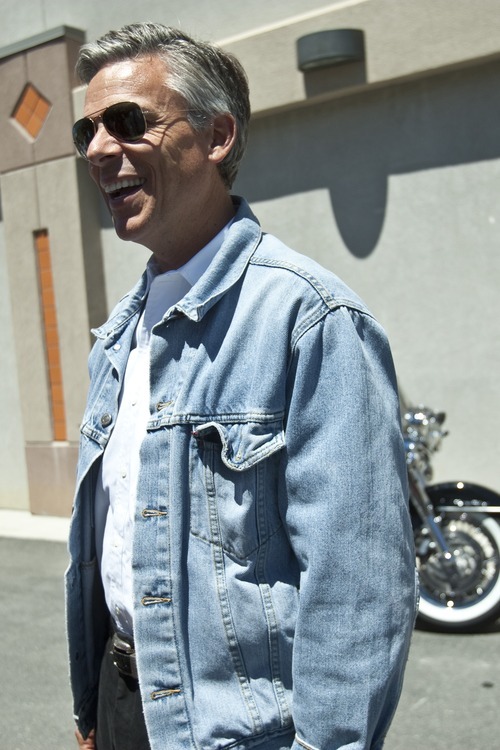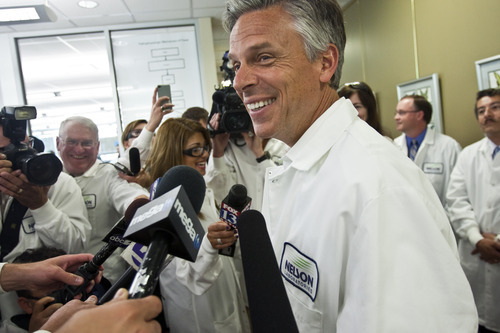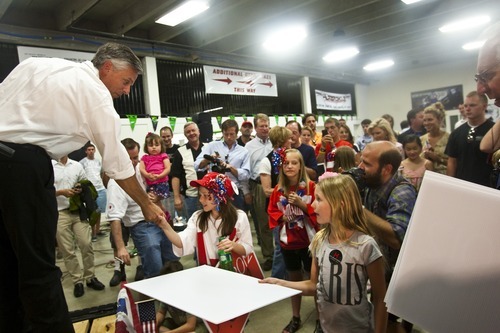This is an archived article that was published on sltrib.com in 2011, and information in the article may be outdated. It is provided only for personal research purposes and may not be reprinted.
A different group may be watching LDS General Conference carefully this year: political operatives and reporters interested in how church teachings may affect Mormon presidential candidates Mitt Romney and Jon Huntsman.
"Once they become aware of that conference, I bet they will cover it, and they will be looking to see what is unique. And, of course, they will be looking to see what is either really weird or odd or different" or even mainstream, says Herb Asher, an emeritus political science professor at The Ohio State University, who has written about presidential campaigns for decades.
Agreeing is Stuart Rothenberg, editor and publisher of the Rothenberg Political Report, a closely watched newsletter that covers campaigns nationally.
"My guess is most political reporters don't know about that conference and what it means," he says. "But my guess is that as they learn about it, it will be of significant interest."
That view isn't universal.
Charlie Cook, editor and publisher of the rival Cook Political Report, says political operatives won't be too interested in General Conference for two reasons: Most don't know about it, and the story about Mormon beliefs of Romney and Huntsman is yesterday's news.
"I sort of heard of the meeting before, but it wasn't on my calendar," Cook says. "I also couldn't tell you when the Southern Baptist convention is or when the Catholic bishops will meet in Washington, D.C. I just don't think it's on the radar of most political reporters."
He adds that most political reporters already did stories extensively on Romney's religion four years ago, when he ran unsuccessfully, and again when two Mormons appeared in the race this year. "But they have moved on. The topic du jour is the economy, the economy, the economy."
Still, other campaigns may view LDS conference as a time to do some opposition research.
"I'd be surprised if Rick Perry and other campaigns didn't have someone watching, and maybe even Democrats anticipating that Romney may do well, to look for anything that may be controversial for use later on," says Quin Monson, associate director of the Center for the Study of Elections and Democracy at Brigham Young University. "But I doubt that it will amount to much."
That's because conference speeches tend to steer away from political issues, Monson says. The talks also get some prior scrutiny because of the need for translation. Also, officials whose addresses wander into controversial areas might be invited to reconsider what they say.
"I think they would be even more careful this year," Monson says, "knowing that they may be watched more closely."
It appears the press is paying more attention.
"An increase in media inquiries has been evident over the past few years," LDS Church spokesman Scott Trotter notes, "with peaks at times of high visibility such as presidential campaigns or other events in the news, such as the 'Book of Mormon' musical."
He adds, "Two international television crews and one international magazine are scheduled to visit around conference time."
Neither Huntsman nor Romney plans to attend conference in Salt Lake City.
Political observers say religion is important in the current White House chase, but maybe not as much as in the past.
"Is Governor Romney's faith a challenge for him politically? Yes," Cook says. "But did it cost him the nomination four years ago? I don't think so."
Cook says evangelicals who will not vote for a Mormon likely would vote against Romney anyway on other issues. Huntsman "is not scratching the surface in the race," he says, and it has to do with his political beliefs, not his religious ones.
Romney's religion may play a bigger role.
"I think those of us who evaluated Mitt last time came to the conclusion that his religion was a significant factor," Rothenberg says. "I suspect that is a significant factor why he is conflicted about Iowa this year and initially said he wouldn't play there."
Rothenberg adds, "Part of the reason evangelicals are looking for someone in Iowa — first [Minnesota Rep. Michele] Bachmann and now [Texas Gov. Rick] Perry — is, I think, there is resistance to an LDS member among white evangelicals in Iowa. ... So religion is a factor. But I think most voters don't like to admit it's a factor."
While Asher says faith is less important to voters now than it was decades ago, he notes candidates still have to clear a minimum threshold when it comes to religious beliefs.
"Clearly, you can't be an atheist and win," he says.
Voters want someone who is generally in the mainstream of religious belief, Asher says, so pundits could be watching General Conference to see if they believe the Salt Lake City-based church meets that threshold.
Rothenberg says Romney erred four years ago when he gave a major speech on religion "where he essentially said, 'I'm as much of a Christian as you are.' My reaction was that was the worst thing to say to an evangelical, that there is no difference between us. That is exactly what they worry about.
"If he said, 'There's a huge deal of difference and nobody will confuse the two of us,' they would be less concerned. They are not concerned about Catholics or Jews. They are just concerned about Mormons," Rothenberg says. "I thought it was big last time, and it continues to define candidate choices in the races this time," and may bring scrutiny to General Conference.
Of note, both Rothenberg and Cook predict evangelicals and other Republicans who would not vote for a Mormon in the primaries would still vote for Romney against President Barack Obama.
Says Cook: "They are the most anti-Obama people on the planet."







